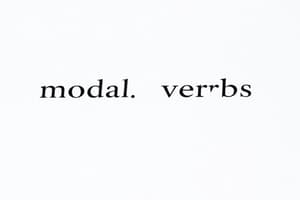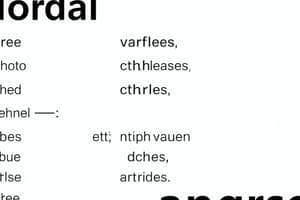Podcast
Questions and Answers
To express a strong belief that something is not true, which modal verb is most appropriate?
To express a strong belief that something is not true, which modal verb is most appropriate?
- Should
- Can't (correct)
- Could
- Must
Which modal verb is suitable for expressing a formal permission?
Which modal verb is suitable for expressing a formal permission?
- Can
- Could
- Should
- May (correct)
If you wanted to give someone advice about trying a new restaurant, which modal verb would best convey that?
If you wanted to give someone advice about trying a new restaurant, which modal verb would best convey that?
- Had better
- Should (correct)
- Must
- Will
Which modal verb would you use to express a polite request?
Which modal verb would you use to express a polite request?
Which modal verb indicates the strongest sense of obligation?
Which modal verb indicates the strongest sense of obligation?
If a sign says, 'You _____ not smoke here,' which modal verb correctly indicates a prohibition?
If a sign says, 'You _____ not smoke here,' which modal verb correctly indicates a prohibition?
Which modal verb best completes this sentence to show past ability: 'When I was younger, I __________ run a mile very quickly.'
Which modal verb best completes this sentence to show past ability: 'When I was younger, I __________ run a mile very quickly.'
To express that something is likely to happen, but with less certainty than 'may', which modal verb is most suitable?
To express that something is likely to happen, but with less certainty than 'may', which modal verb is most suitable?
Choose the correct modal verb to complete the sentence: 'You ______ wear a seatbelt while driving; it's the law.'
Choose the correct modal verb to complete the sentence: 'You ______ wear a seatbelt while driving; it's the law.'
Which of the following modal verbs is commonly used in conditional sentences to describe hypothetical situations?
Which of the following modal verbs is commonly used in conditional sentences to describe hypothetical situations?
Identify the sentence that correctly uses a modal verb to express advice.
Identify the sentence that correctly uses a modal verb to express advice.
Which sentence correctly uses a modal verb to express permission?
Which sentence correctly uses a modal verb to express permission?
Select the sentence where the modal verb expresses a strong necessity or obligation.
Select the sentence where the modal verb expresses a strong necessity or obligation.
Choose the sentence that demonstrates the correct usage of a modal verb for expressing possibility.
Choose the sentence that demonstrates the correct usage of a modal verb for expressing possibility.
Which sentence correctly uses a modal verb to indicate a polite request?
Which sentence correctly uses a modal verb to indicate a polite request?
What does the modal verb 'ought to' express in a sentence?
What does the modal verb 'ought to' express in a sentence?
In the sentence, 'If I had known, I ______ have helped,' which modal verb correctly completes the conditional statement?
In the sentence, 'If I had known, I ______ have helped,' which modal verb correctly completes the conditional statement?
Which sentence demonstrates the correct negative form of a modal verb?
Which sentence demonstrates the correct negative form of a modal verb?
Which of the following sentences correctly uses a modal verb to express a future intention?
Which of the following sentences correctly uses a modal verb to express a future intention?
Which sentence demonstrates the use of a modal verb to deduce a logical conclusion?
Which sentence demonstrates the use of a modal verb to deduce a logical conclusion?
Flashcards
Modal Verbs
Modal Verbs
Auxiliary verbs expressing necessity, possibility, permission, ability, obligation, advice, or probability.
Can
Can
Indicates present ability or possibility.
Could
Could
Expresses polite request, possibility, or past ability.
May
May
Signup and view all the flashcards
Might
Might
Signup and view all the flashcards
Must
Must
Signup and view all the flashcards
Shall
Shall
Signup and view all the flashcards
Should
Should
Signup and view all the flashcards
Will
Will
Signup and view all the flashcards
Would
Would
Signup and view all the flashcards
Ought to
Ought to
Signup and view all the flashcards
Had better
Had better
Signup and view all the flashcards
Must (Obligation)
Must (Obligation)
Signup and view all the flashcards
Have to
Have to
Signup and view all the flashcards
Must (Deduction)
Must (Deduction)
Signup and view all the flashcards
Can't (Deduction)
Can't (Deduction)
Signup and view all the flashcards
Could (Deduction)
Could (Deduction)
Signup and view all the flashcards
Would (Conditional)
Would (Conditional)
Signup and view all the flashcards
Common Mistake: 'to'
Common Mistake: 'to'
Signup and view all the flashcards
Common Mistake: Infinitive
Common Mistake: Infinitive
Signup and view all the flashcards
Study Notes
- Modal verbs are auxiliary verbs expressing necessity, possibility, permission, ability, obligation, advice, or probability.
- They add nuances to the main verb's meaning.
- Common modal verbs include: can, could, may, might, must, shall, should, will, and would.
Characteristics of Modal Verbs
- Modal verbs do not change form regardless of the subject (e.g., he can, they can).
- Modal verbs are always followed by the base form of the main verb (without "to").
- Modal verbs do not have an infinitive or a past participle form.
- They express a range of meanings.
Common Modal Verbs and Their Uses
- Can: Expresses ability or possibility.
- Example: I can swim.
- Example: It can rain tomorrow.
- Could: Expresses polite request, possibility, or past ability.
- Example: Could you please pass the salt?
- Example: It could rain tomorrow.
- Example: I could swim when I was younger.
- May: Expresses permission or possibility.
- Example: You may leave the room.
- Example: It may rain tomorrow.
- Might: Expresses possibility (less certainty than "may").
- Example: It might rain tomorrow.
- Must: Expresses obligation or strong necessity.
- Example: You must wear a seatbelt.
- Example: I must finish this report by tomorrow.
- Shall: Expresses future intention (more formal, often used in suggestions or offers).
- Example: Shall we go for a walk?
- Should: Expresses advice or recommendation.
- Example: You should see a doctor.
- Will: Expresses future intention or prediction.
- Example: I will go to the store later.
- Example: It will rain tomorrow.
- Would: Expresses polite request, conditional statements, or past habits.
- Example: Would you like some tea?
- Example: If I had the money, I would travel the world.
- Example: He would often visit his grandmother.
- Ought to: Expresses moral obligation or advice (similar to "should").
- Example: You ought to apologize.
- Had better: Expresses strong advice or warning.
- Example: You had better be on time.
Expressing Ability (Can/Could)
- "Can" indicates present ability.
- Example: She can play the piano.
- "Could" can indicate past ability.
- Example: He could run fast when he was younger.
- "Could" is also used for polite requests.
- Example: Could you help me, please?
Expressing Permission (Can/Could/May)
- "Can" is informal permission.
- Example: Can I use your phone?
- "May" is formal permission.
- Example: You may enter the room now.
- "Could" is a more polite way to ask for permission.
- Example: Could I borrow your pen?
Expressing Obligation (Must/Have to/Should)
- "Must" expresses internal obligation or strong necessity by the speaker.
- Example: I must study for the exam.
- "Have to" expresses external obligation or necessity due to a rule or law.
- Example: You have to wear a uniform at school.
- "Should" expresses advice or recommendation.
- Example: You should eat more vegetables.
Expressing Possibility (May/Might/Could/Can)
- "May" indicates a higher probability.
- Example: It may rain later.
- "Might" indicates a lower probability.
- Example: It might rain later.
- "Could" indicates possibility or a hypothetical situation.
- Example: It could rain later.
- "Can" indicates general possibility or theoretical probability.
- Example: Smoking can cause cancer.
Expressing Advice (Should/Ought to/Had better)
- "Should" is a general recommendation.
- Example: You should try the new restaurant.
- "Ought to" is similar to "should" but carries a stronger sense of moral obligation.
- Example: You ought to tell the truth.
- "Had better" expresses a strong warning or advice with possible negative consequences.
- Example: You had better be on time, or you'll be in trouble.
Expressing Deduction or Logical Conclusion (Must/Can't/Could)
- "Must" indicates a strong belief that something is true based on evidence.
- Example: She must be tired after working all day.
- "Can't" indicates a strong belief that something is not true.
- Example: He can't be serious.
- "Could" indicates a possible but not certain deduction.
- Example: That could be the reason why he's late.
Modal Verbs in Conditional Sentences
- "Would" is often used in conditional sentences (Type 2 and Type 3).
- Type 2: If I had the money, I would travel the world.
- Type 3: If I had known, I would have helped.
- "Could" and "Might" can also be used in conditional sentences.
- Example: If I had more time, I could learn to play the guitar.
Negative Forms of Modal Verbs
- cannot = cannot or can't
- Example: I cannot swim / I can't swim
- could not = couldn't
- Example: I couldn't hear you
- may not
- Example: You may not enter
- might not
- Example: It might not rain
- must not = mustn't (prohibition)
- Example: You mustn't smoke here
- should not = shouldn't
- Example: You shouldn't eat so much sugar
- will not = won't
- Example: I won't be there
- would not = wouldn't
- Example: I wouldn't do that
Common Mistakes
- Using "to" after modal verbs is incorrect.
- Incorrect: You should to go.
- Correct: You should go.
- Using the infinitive form instead of the base form is incorrect.
- Incorrect: He can to swim.
- Correct: He can swim.
- Confusing "must" and "have to" should be avoided.
- "Must" expresses the speaker's opinion.
- "Have to" expresses an external obligation.
Exercises
- Focus on choosing the correct modal verb.
- Consider the context and the intended meaning.
- Pay attention to the nuances between similar modal verbs.
- Example: "may" vs. "might" for possibility.
- Practice with a variety of sentences.
- Cover different situations and contexts.
- Complete the sentence exercises.
- Fill in the blank with the correct modal verb.
Reading Comprehension
- Identify modal verbs in the reading passage.
- Underline or highlight them.
- Analyze the meaning of each modal verb.
- Determine what it expresses in the context of the sentence.
- Answer comprehension questions related to the modal verbs.
- Show understanding of their function in the passage.
- Focus on the questions.
- Determine which modal verb is most relevant to the answer.
Studying That Suits You
Use AI to generate personalized quizzes and flashcards to suit your learning preferences.




